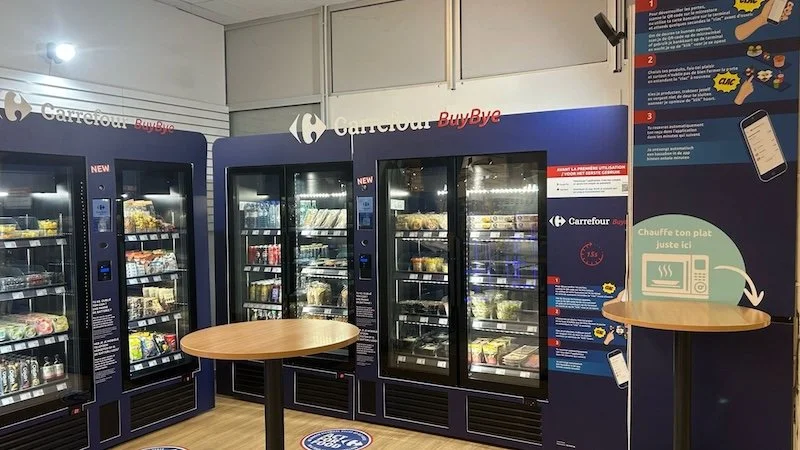The latest from Obsess, Instacart, and AiFi: last week’s most read RTIH retail technology articles
These are the RTIH articles that caught your fancy last week, including Compass Group, AiFi, Carrefour, Amazon, Kroger, Instacart, Sainsbury’s, Marks and Spencer, and Obsess.
Compass Group opens doors to AiFi technology powered bar at Aston Villa football club
Compass Group has opened a second checkout-free location in a UK stadium.
Situated at Premier League football club Aston Villa, this is a bar powered by AiFi technology.
The first bar can be found at Leicester City F.C.
In a LinkedIn post, dated 4th February, Peter Waugh, Digital & Data Director, UK/I, at Compass Group said: “I hate Q’ing, I don’t want to queue behind someone buying food and drink if I just want a drink, I want to maximise the time with my mates, just make it easy, half time is only 15 mins…”.
He added: “OK, no problem…Compass’ second computer vision bar in UK stadia, this time Aston Villa, launched today.”
“Tap your card, enter, pick your drink or food, and walk out. Plus if you want to order your beers and food for half time time, you can, with self-serve kiosks…no waiting. And if you fancy pouring your own - the Holte stand offers that as well.”
Carrefour notches up a first as data and innovation teams explore ChatGPT and generative AI use cases
Carrefour has produced its first ever video made with ChatGPT and generative AI.
The retailer’s avatar answers a common question from its customers: “how to eat better and cheaper via its website”.
In a LInkedIn post, Elodie Perthuisot, Chief E Commerce, Digital Transformation and Data Officer & EXCOM member at Carrefour, said: “For us, artificial intelligence is very concrete: personalisation of purchases, optimisation of assortments, reduction of waste...we are exploring the different uses, at the service of our customers.”
“So, of course, our data and innovation teams are currently working on the use cases of ChatGPT, and generative AI in general. We explore them always keeping our customers as a compass and how to better serve them. To be continued…”
Check out the video here.
E-commerce executive Bill Bennett sets off on new adventure beyond walls of Kroger
Bill Bennett has left Kroger where he held the role of Vice President, Head of E-commerce.
He has yet to reveal his next job, but says he will do so in the near future.
In a LinkedIn post, Bennett said: “After an amazing nearly three years, I’ve made the very tough decision to set off on a new adventure beyond the walls of Kroger.”
“We’ve had an incredible run over the time that I’ve been here. From managing through the craziness of the early pandemic, to welcoming those customers back in store as behaviour normalised, to now getting back to double digit sales growth, we’ve continued our relentless focus on the customer.”
He added: “As I reflect on what the Kroger team has accomplished together over this time, I’m truly astounded by the team’s tenacity, drive, and commitment to excellence.”
Shopping in a flash: Carrefour Argentina enlists startup Go2Future for autonomous stores first
The first autonomous Carrefour Flash store has opened in Latin America.
Tapping Go2Future miniGO technology and using cameras on the ceiling and sensors integrated into the shelves, this is a 50 square metre store located in Argentina, in the town of Pilar, a province of Buenos Aires.
Via an app, the products that customers choose are automatically loaded into a virtual cart and payment is made upon leaving, without the need to use a traditional checkout. It is also possible to buy online and pick up in-store or request home delivery.
“We are excited to be able to implement innovative purchasing alternatives in Argentina,” says Pablo Lorenzo, CEO at Carrefour Argentina.
“We listen to our clients and customers and we know that speed and simplicity are essential characteristics when going to stores. We seek to be up to the task and we hope that in Carrefour Flash they will find an ideal shopping experience.”
Grocery wars: Here’s why Amazon was wrong to bet on retail technology and a new store format
Amazon’s net sales rose 12% to $149.2 billion in the fourth quarter, which was better than expected. Growth was entirely driven by North America and Amazon Web Services (AWS), while International sales fell 5%.
Operating profit fell to $2.7 billion from $3.5 billion a year ago. The decrease includes a $2.7 billion charge relating to the group’s restructuring efforts, including severance costs. AWS was the only division to generate profit, which came in at $5.2 billion.
Amazon CEO Andy Jassy suggested during a call to discuss the quarterly results that the company has fallen short of its grocery ambitions.
According to Jassy, “what the company needs is a distinctive store format that's doing well financially before embarking on a major expansion, a formula Amazon hopes to find this year."
He also stated, "Despite our large business from packaged food and other goods, we have yet to win significant market share in perishables."
Amazon has brought in Tony Hoggett, Peter Bowrey, and Claire Peters to try and find a formula for growth.
“I wish Tony, Peter, and Claire well but we have a different point of view on what Amazon should do. The brutal truth is that it has made significant mistakes with its grocery strategy since it acquired Whole Foods Market,” says Brittain Ladd, a supply chain consultant and former Amazon executive.
“Whereas Kroger and Walmart accelerated their strategies for groceries, Amazon bet on technology and a new store format to erase the fact that Kroger is over 100 years old, and Walmart has been selling groceries since 1988.”
“It hasn't worked. Kroger, who is trying acquire Albertsons, and Walmart, operate nearly 9,000 stores in the US. Aldi will operate 2,500 stores by 2024. Amazon operates less than 600 stores. Amazon is at a massive disadvantage in groceries controlling less than 2% market share.”
Reducing shopper friction: Honeywell’s Tony Boncore gives retail technology takeaways from NRF 2023
The shopper is the channel, argues Tony Boncore, one of Honeywell’s global retail experts.
After the discussions he had with attendees at NRF 2023 in New York last month, alongside partners and other vendors, that’s one of his three big takeaways from the show.
Click here to read more.
Strange things are happening in self-service at UK retailers Marks and Spencer and Sainsbury’s
Leigh Sparks, Professor of Retail Studies, Deputy Principal, University of Stirling, and Chair Scotland's Towns Partnership, has been discussing the wider move to non-food self service in M&S and self-service checkouts generally.
In an online post, he notes that his Twitter timeline has been populated recently by photos of retailers doing, for her, some strange things with self-service tills.
“These tills have popped up everywhere over the last decade and not always to universal acclaim. B&Q and WHSmith have often been prime offenders, but there are new culprits on the block,” he writes.
Enter Sainsbury’s and Marks and Spencer.
Alo Yoga teams with RTIH Innovation Awards winner Obsess on virtual reality shopping experience
Alo Yoga, an activewear and lifestyle brand, has launched an immersive digital shopping experience complete with virtual reality integration, digital styling capabilities, streaming beauty and wellness tutorials, workout classes, and checkout.
It has partnered on this with 2022 RTIH Innovation Awards winner, Obsess, with users able to experience it via desktop, mobile, or the Meta Quest 2 VR headset.
Evri becomes first carrier to host new Drop Box and Printer capability from Parcel Pending by Quadient
Quadient has introduced an additional feature for its Parcel Pending by Quadient smart lockers that enables shoppers to easily drop off parcels, with the added ability to print shipping labels if needed.
As the new solution becomes available in the UK, Evri will be the first carrier to offer the Drop Box and Printer capability to its customers.
It is one of four international carriers that have joined the Quadient smart locker open network in the UK.
This currently accounts for about 300 locker stations in operation, with plans to reach 5,000 units in the coming years at the pace of about 200 new locations per month.
US grocer Foodcellar Market deploys Scan & Pay checkout technology powered by Instacart
Instacart has announced the launch of Scan & Pay in partnership with Long Island City grocer, Foodcellar Market.
The retailer is the first to fully debut this technology for in-store shopping.
Foodcellar can now allow customers to scan the barcodes of their items – including produce – while shopping and pay directly through their phones. This means no more waiting in line.
Scan & Pay links items bought in-store to customers’ online Instacart account, making it easier to shop their preferred items from Foodcellar.















Continue reading…